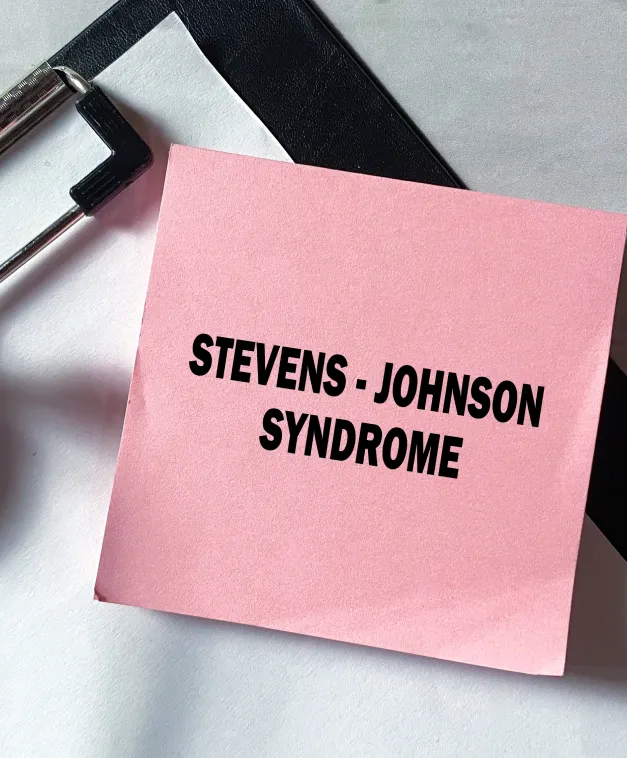Yes, in many cases, it is possible to sue for Stevens-Johnson Syndrome (SJS). This devastating condition is often triggered by an adverse reaction to a medication, and if a drug manufacturer, doctor, or another party was negligent, you may have the right to seek justice and compensation. Speaking with an experienced Stevens-Johnson Syndrome Lawyer can help you understand your rights and determine who may be legally responsible for your illness.
Experiencing SJS or watching a loved one go through it is a traumatic and life-altering event. The sudden onset of painful symptoms can leave you searching for answers. Understanding your legal options is a critical step toward regaining a sense of control and securing the resources needed for recovery.
Key Takeaways for Suing for Stevens-Johnson Syndrome
- Stevens-Johnson Syndrome (SJS) is a severe and rare skin reaction most commonly caused by certain medications.
- Legal action for SJS often falls under product liability law, specifically focusing on a drug manufacturer's "failure to warn" consumers and doctors about serious risks.
- Parties that could potentially be held responsible in a lawsuit include pharmaceutical companies, prescribing doctors, or pharmacies.
- Compensation in an SJS lawsuit can cover medical bills, lost income, and the immense physical and emotional pain and suffering caused by the condition.
- The legal process involves a detailed investigation to identify the specific medication responsible and prove that negligence occurred.
- A person affected by SJS may be able to pursue a claim to hold the responsible parties accountable for the harm they endured.
Understanding the Devastating Impact of Stevens-Johnson Syndrome (SJS)
Before exploring the legal avenues, it's important to acknowledge the profound impact of this condition. Stevens-Johnson Syndrome, often referred to as SJS, is a rare but extremely serious disorder that affects the skin and mucous membranes. It often begins with flu-like symptoms, such as fever, sore throat, and fatigue. Within a few days, a painful, red or purplish rash develops and spreads, forming blisters. The top layer of the affected skin dies and sheds.
In its most severe form, the condition is called Toxic Epidermal Necrolysis (TEN), where more than 30% of the body's skin surface is affected. According to information from the Mayo Clinic, recovery from SJS can take weeks to months, and the condition requires immediate hospitalization, often in a burn unit or intensive care unit.
The long-term effects of SJS can be just as challenging as the initial illness. Many survivors are left with permanent complications that change their lives forever.
- Permanent Skin Damage: Survivors often experience significant scarring, changes in skin pigmentation, and chronic dryness.
- Severe Eye Problems: The mucous membranes in the eyes are frequently damaged, leading to chronic dry eye, light sensitivity (photophobia), corneal scarring, and in some cases, partial or complete vision loss.
- Internal Organ Damage: SJS can cause inflammation and damage to internal organs, including the lungs, kidneys, and liver, sometimes leading to long-term health issues.
- Chronic Pain and Fatigue: Many individuals report ongoing pain, nerve damage, and persistent fatigue that can make returning to work and daily activities incredibly difficult.
These lasting consequences highlight why the physical, emotional, and financial recovery from SJS is a long and arduous road.
What Causes SJS? The Link to Medications

The single most common trigger for Stevens-Johnson Syndrome is an adverse reaction to a medication. While any drug could potentially cause SJS, certain types have been more frequently linked to the condition. This reaction isn't an overdose or an allergic reaction in the typical sense; it's an unpredictable and severe immune system response to the drug.
Some of the medications associated with a higher risk of SJS include:
- Allopurinol: A medication used to treat gout and kidney stones.
- Certain Antibiotics: Particularly sulfa-based antibiotics.
- Anti-Seizure Medications: Drugs used to treat epilepsy and nerve pain.
- Non-Steroidal Anti-Inflammatory Drugs (NSAIDs): Certain over-the-counter and prescription pain relievers.
The U.S. Food and Drug Administration (FDA) has issued warnings about the risk of SJS for specific drugs, requiring updated labels to inform both doctors and patients. The fact that a drug is FDA-approved does not mean it is free from risk, nor does it protect its manufacturer from liability if they fail to adequately warn of known dangers. This failure to provide a clear and sufficient warning is often the central issue in a legal case to sue for Stevens-Johnson Syndrome.
The Legal Grounds to Sue for Stevens-Johnson Syndrome

When you consider whether you can sue for Stevens-Johnson Syndrome, you are entering the area of law known as product liability. In simple terms, product liability law holds manufacturers, distributors, and sellers responsible for injuries caused by defective or dangerous products they put on the market. In the context of SJS, the "product" is the medication that triggered the reaction.
A lawsuit for SJS is typically not about claiming the drug should never have been sold. Instead, it often centers on the idea that the drug was sold without proper warnings about its potential to cause this horrific condition. There are a few key legal arguments that can be made.
Failure to Warn
This is the most common basis for an SJS lawsuit. Drug manufacturers have a legal and ethical duty to warn the medical community and the public about the known risks and serious side effects of their products. A "warning" isn't just a long list of possible issues in tiny print. It needs to be clear, direct, and proportional to the risk.
A failure-to-warn claim argues that the drug company:
- Knew or should have known about the risk of SJS associated with their medication.
- Failed to provide an adequate warning on the drug’s label, marketing materials, or information provided to doctors.
- This inadequate warning led to a doctor prescribing the drug or a patient taking it without being fully aware of the severe potential consequences.
If the warning label downplays the risk or omits it entirely, the manufacturer can be held accountable for the resulting harm.
Medical Malpractice
While many SJS lawsuits focus on the drug manufacturer, there are situations where a healthcare provider's actions (or lack thereof) may have contributed to the harm. Medical malpractice is a legal term for when a doctor, hospital, or other healthcare professional causes an injury to a patient through a negligent act or omission.
Examples that could potentially constitute medical malpractice in an SJS case include:
- A doctor prescribing a high-risk medication without discussing the potential for a severe skin reaction or advising the patient on what early symptoms to watch for.
- Failing to provide an accurate SJS diagnosis in a timely manner, mistaking the early rash for a less serious condition, and allowing the disease to progress.
- Wrongly prescribing a medication to a patient with a known history of adverse reactions to similar drugs.
These cases are complex and depend heavily on the specific details of the medical care provided.
Who Can Be Held Accountable in an SJS Lawsuit?
Determining who is legally responsible for the damages caused by SJS requires a careful and thorough investigation. Depending on the circumstances, one or more parties could be named in a lawsuit.
- The Drug Manufacturer: As mentioned, the pharmaceutical company that designed, manufactured, and marketed the drug is often the primary defendant. Their deep knowledge of the drug's chemical properties and clinical trial data puts them in the best position to understand and warn about its risks.
- The Prescribing Doctor or Healthcare Provider: A doctor has a duty of care to their patients. This includes taking a thorough medical history, understanding the risks of the drugs they prescribe, and properly monitoring their patients. If their actions fell below the accepted standard of medical care, they could be held liable.
- The Pharmacy: In less common scenarios, a pharmacy could be at fault. This might occur if the pharmacist dispensed the wrong medication or the wrong dosage, or if they failed to provide required warning information along with the prescription.
Identifying the responsible parties is one of the most critical steps in building a strong case to sue for Stevens-Johnson Syndrome.
Understanding Compensation in a Stevens-Johnson Syndrome Lawsuit
If you decide to sue for Stevens-Johnson Syndrome and are successful, you may be awarded damages. This is the legal term for money intended to compensate you for the losses you have suffered. The goal is to help restore you, as much as possible, to the position you were in before this tragedy occurred.
Compensation in an SJS case is designed to cover a wide range of losses, both economic and non-economic.
- Medical Expenses: This includes reimbursement for all past medical bills—hospital stays, surgeries, rehabilitation, medications, and therapy—as well as the estimated cost of all future medical care you will need for SJS-related complications.
- Lost Wages and Earning Capacity: You can be compensated for the income you lost while you were unable to work. If the long-term effects of SJS prevent you from returning to your previous job or limit your ability to earn a living in the future, you can also seek damages for this loss of future earning capacity.
- Pain and Suffering: This is compensation for the immense physical pain, emotional distress, and mental anguish you have endured. SJS is an incredibly painful condition, and the law recognizes that this suffering deserves to be acknowledged.
- Disfigurement and Scarring: This provides compensation for the permanent changes to your appearance, such as scarring and skin discoloration, and the emotional impact of living with these changes.
Every SJS case is unique, and the amount of potential compensation will depend on the severity of your injuries, the extent of your financial losses, and the specifics of your situation.
Why You Need a Compassionate Legal Advocate

Taking on a multi-billion-dollar pharmaceutical company or a large hospital system can feel like an impossible fight. These corporations have teams of lawyers dedicated to protecting their interests. You deserve to have someone just as dedicated in your corner, fighting for you.
An experienced personal injury law firm can level the playing field. They handle all aspects of the legal process, from conducting a deep investigation into the cause of your SJS to gathering evidence and negotiating on your behalf. They can consult with medical professionals to strengthen your claim and build a compelling case that shows exactly how this condition has impacted your life.
Most importantly, a compassionate legal team understands that you are not just a case file; you are a person who has been through an unimaginable ordeal and deserves to be treated with dignity and respect.
FAQs: Sue for Stevens-Johnson Syndrome
Here are answers to some common questions that arise when people are considering their legal options after an SJS diagnosis.
How long do I have to file a lawsuit for SJS?
Every state has a law called the statute of limitations, which sets a strict time limit on your right to file a lawsuit. This time period varies from state to state and can be complex to calculate. It is crucial to speak with an attorney as soon as you are able to in order to protect your right to seek justice.
What does it cost to hire a lawyer for an SJS case?
Most personal injury law firms that handle these types of cases work on a contingency fee basis. This means you do not pay any upfront fees. The law firm covers all the costs of investigating and pursuing your case. They only receive a fee if they successfully recover compensation for you, which is typically a percentage of the final settlement or award.
My loved one passed away from SJS/TEN. Can our family still take legal action?
Yes. When a person dies as a result of someone else's negligence, their surviving family members may be able to file a wrongful death lawsuit. This type of claim seeks compensation for the family's losses, such as the loss of financial support, companionship, and emotional distress, as well as funeral and burial expenses.
How can I prove which specific medication caused my Stevens-Johnson Syndrome?
Proving causation is a critical and complex part of an SJS lawsuit. A legal team will work with medical professionals to analyze your medical records, the timeline of when you started each medication, and the onset of your symptoms. This process, often called a differential diagnosis, helps to systematically identify the most likely culprit among the drugs you were taking.
Greg Jones Law: Let Us Fight for the Justice You Deserve
We understand that reading this information may bring up difficult emotions. The journey you have been on is one that no one should ever have to endure. At Greg Jones Law, our dedicated team has built a practice on standing up for people who have been harmed by the negligence of powerful corporations and other parties. We know the fight against large pharmaceutical companies can seem daunting, but it is a fight we are prepared for.
You should not have to carry the financial and emotional burden of Stevens-Johnson Syndrome alone. Let us help you hold the responsible parties accountable and pursue the compensation you need to rebuild your life. We handle cases for clients across the nation and will give your case the personalized attention and tireless advocacy it deserves. If we don’t recover money for you, you won’t owe us anything.
Contact Greg Jones Law today at (910) 251-2240 or through our online form for a free, no-obligation consultation. Let’s talk about your story and how we can help.
